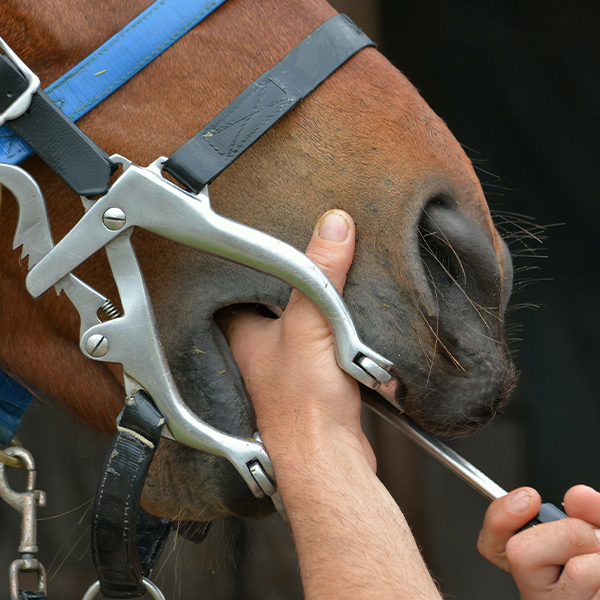Well-tended coat, the thunder of powerful hooves, and the graceful unity of horse and rider. These scenes capture the essence of equestrian sports, but often overlook a key aspect of the horse’s health — their teeth.
In the realm of veterinary care, an often under-appreciated yet integral element in the equation of equine health, nutrition and performance is the regular dental examination of our equine companions.
Dental health plays a great deal of importance in the life and work of horses. From the mechanics of chewing to the subtle cues of dental distress, it is important to have an intimate understanding of your horse’s oral well-being.
To appreciate the significance of dental care, one must first grasp the intricacies of a horse’s feeding behavior. Evolution has crafted the equine’s digestive system for the rigors of forage. Hence, horses constantly produce saliva while their jaw works in an elliptical motion, grinding away at grasses and grains. This repetitive action not only wields the benefits of nutrient extraction but also aids in digestive health, acting as a natural buffer against gastro issues such as ulcers.
However, when dental issues arise, they don’t just affect the mouth; they reverberate throughout the horse’s body. Poor dental health can lead to malnutrition, colic, discomfort, and behavioral changes. This makes regular dental exams more than just a veterinary formality but a pivotal component of proper equine management.
Horses are adept at concealing discomfort, a trait that stems from their survival instincts in the wild. Yet, there are signs — subtle and not so — that their teeth may be the trouble.
Changes in weight or body condition, difficulty eating, unexplained drop in performance, and even resistance to the bit during riding are all potential indicators that your horse may be struggling with dental issues. In young horses, malocclusions, or misalignments of teeth, can lead to improper wear and tear. Conversely, aged horses often face the erosion of tooth surfaces or the loss of teeth entirely.
The list of possible dental problems is extensive, ranging from sharp enamel points and overgrowths to more complex issues like periodontal disease and abscesses. Each ailment carries its own set of symptoms, highlighting the need for attentive horse care and professional dental evaluations.
Behavioral changes can be the most apparent sign of dental distress, affecting the horse’s demeanor in various settings. When ridden, a horse with dental pain might flinch away from the bit, toss its head, or show aversion to certain movements. In-hand work can also become a struggle as the horse attempts to communicate its unease through resistance or erratic behavior.
Naturally, such disruptions in performance can become frustrating for both horse and rider, leading to potential miscommunications and a breakdown in the training process. By understanding how dental pain can manifest in the horse’s actions, equestrians can better correlate changes in behavior with potential oral issues and provide the necessary care.
Proactive monitoring of your horse’s dental health requires vigilance. Regular checks for signs of sharp enamel points, missing, or loose teeth can be conducted at home but should always be followed by professional assessments. Veterinarians with equine expertise utilize both manual and technological methods, such as sedated oral exams and dental radiography, to provide a thorough evaluation.
Owners must also be attentive to the horse’s age, as different dental concerns become prevalent at various life stages. This includes vigilance over the growth of permanent teeth in young horses and the rollover of incisors in older equines, which can indicate difficulties in the wear pattern.
If there’s one constant in the care of horses, it’s the power of routine. Regular dental exams should be penciled into the calendar alongside vaccinations and farrier visits. Neglecting the annual check-up, or waiting for symptoms to appear, can result in not only compromised oral health but also detriment to the horse’s overall condition and ability to perform.
Adhering to a structured maintenance routine will not only benefit the horse but also the rider and any stakeholders invested in the animal’s well-being. Prevention and early intervention are pivotal in the equine dental realm, ensuring that minor issues are addressed before they blossom into impediments to performance or — worse — threats to the horse’s vitality.
Horses depend on us for their dental care, as they do for every facet of their well-being. By integrating regular dental examinations into their health regimen, we honor our responsibility to our horses, equipping them for the best quality of life and peak performance.
From the trail to the stables, the health of your horse’s teeth is silently influential, a spinner of the web that supports the grand tapestry of equestrianism. It is our keen observation, timely interventions, and commitment to comprehensive care that will ensure our horse is supported through oral health, which is a key component to nutrition, behavior and performance.










